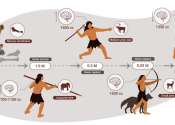Declining deer population likely due to natural regulation
Scientists have shown that the population of the Yakushima sika deer has declined due to natural factors, suggesting that the population can be regulated without culling.

Scientists have shown that the population of the Yakushima sika deer has declined due to natural factors, suggesting that the population can be regulated without culling.
Plants & Animals
May 31, 2021
0
11

When do bees sting and how do they organize their collective defense behavior against predators? An interdisciplinary team of researchers from the Universities of Constance and Innsbruck has provided new insights into these ...
Plants & Animals
May 26, 2021
0
17

It's the smell that hits you first. The scent of urine and decomposing bodies. Then you notice other signs: scuttles and squeaks, small dead bodies leaking blood, tails sticking out of hubcaps.
Plants & Animals
May 21, 2021
0
15

The population of white sharks that call the Central California coast their primary home is holding steady at about 300 animals and shows some signs of growth, a new long-term study of the species has shown.
Plants & Animals
May 19, 2021
0
51

A team of researchers has discovered a fossil they are describing as a leftover fall event in which one creature was in the process of eating another creature that was not consumed. In their paper published in the Swiss Journal ...

Predatory bacteria—bacteria that eat other bacteria—grow faster and consume more resources than non-predators in the same soil, according to a new study out this week from Northern Arizona University. These active predators, ...
Cell & Microbiology
Apr 28, 2021
0
13

Dozens of sharks gathered Tuesday in warm waters of the Mediterranean near an Israeli power plant, drawing sightseers in what has become an annual occurence.
Ecology
Apr 20, 2021
0
14

A new study revealed that a drastic reduction of deaths of one of Africa's rarest primates, the Zanzibar red colobus (Piliocolobus kirkii), followed the installation of four speedbumps along a stretch of road where the species ...
Plants & Animals
Apr 8, 2021
0
19

Researchers at Tel Aviv University were able to reconstruct the nutrition of stone age humans. In a paper published in the Yearbook of the American Physical Anthropology Association, Dr. Miki Ben-Dor and Prof. Ran Barkai ...
Archaeology
Apr 5, 2021
9
2562

Polar bears are often considered the poster-child species for climate change impacts. With global warming and sea-ice declines, it becomes harder for polar bears to hunt their preferred prey—seals. Increased global temperatures ...
Plants & Animals
Apr 2, 2021
4
203